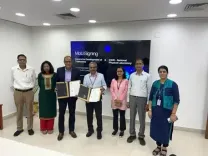Is Seoul Seeking 'Special Consideration' from the U.S. on Chip Imports?

Synopsis
South Korea has urged the U.S. for 'special consideration' concerning its semiconductor exports amidst looming tariffs. Discover how this request could impact the global semiconductor landscape and investment strategies as nations navigate trade dynamics.
Key Takeaways
- South Korea requests special consideration for its semiconductor exports amid tariff considerations.
- Potential tariffs could impact Korean investment plans in the U.S.
- Trade balance between South Korea and the U.S. in semiconductors is nearly equal.
- Close consultations between governments are ongoing.
- Acting President Lee Ju-ho emphasizes economic security amid changing trade dynamics.
Seoul, May 7 (NationPress) South Korea has formally requested the United States to give "special consideration" to its semiconductor exports as the Trump administration contemplates imposing tariffs on imported chips, according to the nation's industry ministry on Wednesday.
The South Korean government has submitted a written opinion to U.S. authorities regarding Washington's national security review concerning semiconductor imports, as outlined under the U.S. Trade Expansion Act, as reported by Yonhap news agency.
The Trump administration is currently investigating potential tariffs on both semiconductors and pharmaceuticals.
In its official statement, the South Korean government urged for "special consideration" of its chip exports to the U.S., asserting that semiconductors and manufacturing equipment produced in Korea have "very limited" implications for U.S. security and supply chains.
The statement further indicated that the anticipated tariffs on chip imports could adversely impact Korean firms' investment strategies in the U.S., particularly concerning artificial intelligence (AI) infrastructure.
Seoul also pointed out that the trade balance in the semiconductor industry between the two nations is nearly equal, according to the ministry's report.
"The government will persist in maintaining close consultations with the U.S. at all levels to mitigate any detrimental effects on Korean companies," the ministry affirmed.
"We will also ensure ongoing communication with industry stakeholders and formulate strategic response measures, while continuing collaborative outreach efforts from both public and private sectors in the U.S.," it added.
In the meantime, Acting President Lee Ju-ho stated that the government will engage closely with the Czech Republic to expedite the finalization of a nuclear power plant agreement that was recently delayed by a court injunction.
Lee made the comments during an economic security strategy meeting, a day after a Czech court blocked CEZ, the country's primary electricity provider, from finalizing a contract with a South Korean consortium led by Korea Hydro & Nuclear Power Co., estimated at 26 trillion won (approximately US$18.6 billion), pending a review of a legal complaint from France's EDF, a losing bidder in the tender.
"Our government will communicate actively with the Czech side to finalize the contract as quickly as possible," he emphasized during the meeting held at the government complex in Seoul.
"The Czech government has indicated that there are no issues, asserting that the tender evaluation process was conducted transparently and legally," he added.
During the court ruling, Industry Minister Ahn Duk-geun was in Prague, en route to a signing ceremony for the deal.
The acting president also stressed the significance of the trade environment in light of the new tariffs imposed by the United States on imported goods.
Both nations will continue discussions on tariffs during the upcoming visit of U.S. Trade Representative Jamieson Greer to South Korea next week for the Asia-Pacific Economic Cooperation trade ministers' meeting, he noted.









